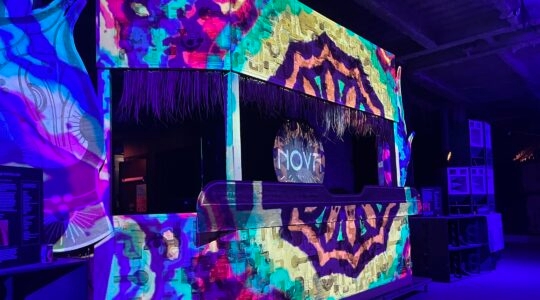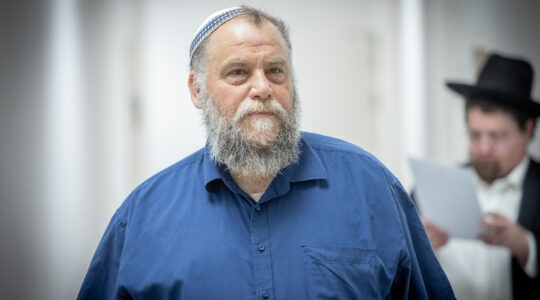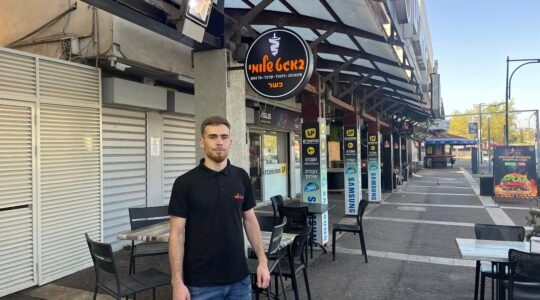
Ballet dancers at a dance school set up in Israel by immigrants from the former Soviet Union practice in the studio. (Limor Edrey)
TEL AVIV (JTA) — At Nanuchka, every table is filled upstairs and down, the bar is packed and a line has formed outside.
A Georgian restaurant with offerings such as goose and beef dumplings and homemade pickles, Nanuchka at first glance may seem an unlikely nighttime hot spot for Tel Aviv, with its shabby-chic decor a hodgepodge of gilded mirrors, oil paintings and purple glass chandeliers.
“I started this place as a project and a challenge: to transform the image of Georgians here into something noble,” said owner Nana Shrayer, 41, an immigrant from the former Soviet republic of Georgia. “It looks like I’ve succeeded.”
As far as Shrayer can tell, only one table in the restaurant is occupied by Georgians, Nona Rafaeli’s family, which has come to celebrate a birthday.
“I love that so many young Israelis are here,” said Rafaeli, a doctor who immigrated in 1995. “They clearly feel so comfortable here, and that’s a great affirmation.”
Twenty years since the beginning of the historic wave of immigration that brought approximately 1.1 million newcomers to Israel from the former Soviet Union between 1989 and 2000, Nanuchka is one small example of how immigrant subcultures are providing a home for fellow immigrants while integrating and contributing to Israeli society.
To be sure, some elements of Russian immigrant culture have not resonated with Israelis. But in fields such as education, theater, sports and music, a rich exchange has taken place, and the immigrants’ contributions can be felt particularly strong in Israel’s high-tech, medical and academic sectors.
The massive aliyah was unprecedented for Israel, both in its sheer size — Russian-speaking Israelis now constitute the largest single minority group in the country — and in the high educational and professional background of so many who came. Some 70 percent of those who immigrated are college-educated.
The 100,000 engineers that came in the aliyah, among them computer and electrical engineers, became the backbone of Israel’s emerging high-tech sector in the 1990s, constituting the relatively cheap labor and know-how that helped give the industry its competitive edge.
The 23,000 doctors and 25,000 nurses who came transformed the face of Israeli hospitals and clinics. The arrival of the doctors has been credited with saving Israel’s medical system from a shortage.
Russian-speaking immigrants are credited with raising the level of science, research and teaching in the country. Nearly 70 percent of the math faculty at Ben-Gurion University of the Negev, for example, is comprised of immigrants from the former Soviet Union.
Russian-speaking immigrants have worked to enter Israeli society under their own terms, determined to integrate while preserving their own culture.
Immigrant parents and teachers, discouraged by the level of education in the Israeli school system, have established networks of enrichment courses inside schools and as extracurricular programs in subjects such as physics, math and literature. At first they included mostly children of Russian-speaking immigrants, but now they are popular among other Israelis.
Russian media also have established a strong presence in Israel. In the mid-1990s, Russian-language print media peaked at 130 periodicals, including four daily newspapers and dozens of weeklies. With the arrival of a Russian-language television station and the Internet, many of the publications have folded. But Russian-language Web sites, including sites focused on Israeli news and politics, are flourishing.
Some 200 Russian bookstores and local presses are publishing about 300 Russian-language titles every year. Some authors have significant followings in the former Soviet Union, although they remain unknown to most Israelis.
Music has been more easily translatable.
“Israel has received us well,” said Galina Gloushkin, first violist with the Israeli Symphony Orchestra-Rishon LeZion. Gloushkin emigrated from Moscow in 1991 with a pair of cleaning gloves in her suitcase, preparing for the possibility that she would not find work as a musician.
“Here there is no truly high-level musician that does not work,” she adds, noting that the orchestra with which she performs was created by the city of Rishon LeZion in large part to provide employment for immigrant musicians.
Amir Bakman, a native Israeli oboe player in the orchestra whose talent was cultivated by Russian-speaking teachers, is grateful for the immigrants’ contribution.
“Classical music would exist without this aliyah, but it has contributed so greatly by having so many top musicians along with the audience it provides,” he said. “Because of them there is both supply and demand.”
Even Israeli rock music has been cross-fertilized by young immigrant musicians who have brought the styles of their home countries to Israel, then exported them back to the former Soviet Union interlaced with the Oriental motifs they found in the Middle East.
In the southern coastal city of Ashdod, which has the highest percentage of Russian-speaking immigrants in the country — some 35 percent of its 75,000 residents — immigrant groups perform a series of music festivals offering a mix of jazz, classical and klezmer concerts.
Immigrants have founded ballet schools, gymnasiums, poetry reading groups and literature clubs in the city. Store signs can be seen in Russian and Hebrew. Russian groceries sell dense brown bread of the variety found in Russia, tins of caviar, Russian teas and pre-made frozen packages of dumplings. It was here that the highly successful Tiv Tam company began — known in Israel for its sale of non-kosher items like cuts of pork and bags of frozen shrimp.
It’s one of the elements of Russian-speaking society that has dismayed some religiously observant Israelis. Aside from the surge in pork-related products in Israel, the immigration from the former Soviet Union along with the arrival of foreign laborers has brought the sale of Christmas trees and Santa dolls to Jewish cities for the first time. And, more significantly, hundreds of thousands of immigrants not considered Jewish according to halachah, or traditional Jewish law.
That has forced Israel to grapple with some fundamental questions about its Jewish identity. Israel’s Law of Return allows only for those with at least one Jewish grandparent to immigrate, along with their spouses. Many immigrants from the former Soviet Union want the government to ease its immigration criteria to allow non-Jewish family members to come to Israel.
Many couples from the community cannot marry legally in Israel because both partners are not Jewish, and Israeli law bars Jews from marrying non-Jews. Some have turned to conversion as a solution, but for the most part the requirements of conversion — a long and rigorous process in which prospective converts must pledge to become observant, since only Orthodox conversions are recognized in Israel — is impractical for most.
Immigrants and their children who have grown up in Israel and encounter this problem say they are resentful of a system that readily accepts them for military conscription — one in five Israeli soldiers hails from the Russian-speaking immigrant community — but does not consider them full Jews.
“It’s an issue that hurts many,” said Michael Zinigrad, a chemistry professor who emigrated from Russia in 1992 and is now rector of the Ariel University Center.
Elazar Leshem, an immigration expert affiliated with the Hebrew University and Ariel University Center, says one of the main reasons potential immigrants from the former Soviet Union who have not come to Israel are staying away is the sense that families with mixed Jewish parentage suffer discrimination in Israel.
“Israel is losing out on a huge human resources as a result,” he said.





